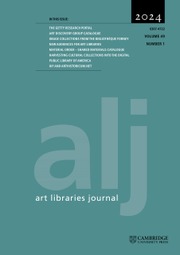Crossref Citations
This article has been cited by the following publications. This list is generated based on data provided by Crossref.
Frioux-Salgas, Sarah
and
Dalex, Françoise
2008.
Tools for studying the collections at the musée du quai Branly: paper archives and electronic research.
Art Libraries Journal,
Vol. 33,
Issue. 2,
p.
17.


